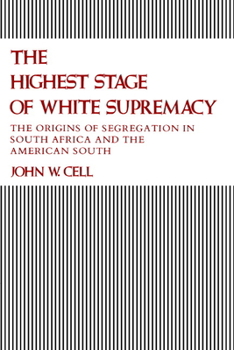The Highest Stage of White Supremacy
An original and exciting work of comparative history, this book analyses the origins of segregation as a specific stage in the evolution of white supremacy in South Africa and the American South. Unlike scholars who have attributed twentieth-century patterns of race relations to the continuation of earlier social norms and attitudes, Cell understands segregation as a distinct system and ideology of race and class division, closely associated with urbanisation, industrialisation, and modern processes of state and party formation. Originally advocated by moderates and liberals, rather than by racist fanatic with whom it later came to be identified, segregation became comparatively sophisticated, flexible, and absorptive. In its ambiguities even advocates of black power could sometimes find a basis for collaboration.
Format:Paperback
Language:English
ISBN:0521270618
ISBN13:9780521270618
Release Date:October 1982
Publisher:Cambridge University Press
Length:336 Pages
Weight:1.06 lbs.
Dimensions:0.8" x 6.0" x 9.0"
Customer Reviews
0 rating





